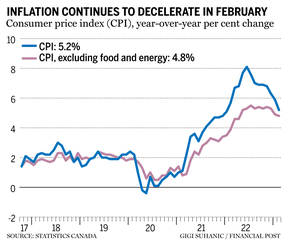Decelerates faster than expected in February to 5.2 per cent
Article content
Inflation surprised economists decelerating faster than expected in February to 5.2 per cent year over year, according to Statistics Canada, giving the Bank of Canada more breathing room to keep interest rates steady at its next meeting on April 12.
Advertisement 2
Article content
The fresh data, released on March 21, beat analyst estimates for inflation to slow to 5.4 per cent in February and was the largest deceleration since April 2020, said Statistics Canada, which attributed much of the slowdown to the base-year effect — the data against which the most recent numbers are compared — of “steep” monthly increases in February 2022.
Article content
“Canadian inflation started its rapid fall in February, which should continue over the next few months as last year’s large price increases fall out of the annual calculation,” said Karyne Charbonneau of CIBC Economics in note on March 21.

On a monthly basis, unadjusted basis, inflation also came in below estimates, rising 0.4 per cent in February compared with 0.5 per cent in January. Analysts expected it to increase 0.5 per cent.
Advertisement 3
Article content
But, digging below the headline numbers, economists identified some “stickiness.” The consumer price index (CPI) excluding food and energy came in at 4.8 per cent year over year, higher than the same time last year, said Randall Bartlett of Desjardins Economics in his note on March 21, adding that the monthly CPI reading accelerated 0.3 per cent from January, seasonally adjusted.
“That caused the three-month annualized rate of inflation in this traditional measure of core CPI to accelerate to 3.4 per cent from 3.1 per cent,” Bartlett said.
Grocery prices remained among the biggest contributors to still-elevated inflation, with prices for food purchased at stores increasing to 10.6 per cent in February from last year, the seventh consecutive double-digit increase in the category, StatCan said. Price gains did slow from January when they increased at 11.4 per cent year over year.
Article content
Advertisement 4
Article content
Gasoline provided relief to Canadians’ wallets falling 4.7 per cent, “the first yearly decline since January 2021,” Statistics Canada said. For the month, Canadians paid one per cent less at the gas pumps. Overall energy prices fell 0.6 per cent year over year, the first decline since January 2021.
However, the costs of mortgages accelerated in February 23.9 per cent year over year compared with 21.2 per cent in January, “the fastest pace since July 1982,” the national data agency said, attributing it to Canada’s higher interest rates.
“Mortgage interest costs are now one of the biggest drivers of inflation…,” said Douglas Porter, chief economist at Bank of Montreal. “Many will thus point to the BoC as the ’cause’ of inflation, although note that inflation is still 4.7 per cent even excluding mortgage interest costs.”
Advertisement 5
Article content
Bartlett of Dejardins also said “elevated shelter costs are part of the story.” But, he said, “services inflation excluding shelter remains troublingly high as well.”
Canada’s latest consumer price index reading ranks at the low end of inflation for advanced economies, BMO’s Porter said in a note on the data. The U.S. inflation rate was six per cent last month, Australia 7.2 per cent, the eurozone 8.5 per cent, and the U.K. 10.1 per cent.
The Bank of Canada’s overnight lending rate currently sits at 4.5 per cent, up 425 basis points from 0.25 per cent in March 2022 when it embarked on an unprecedented rate hiking campaign to try and tame fast-rising inflation that peaked at 8.1 per cent in June of last year.
Here’s what the economists are saying about inflation and what it means for the Bank of Canada and interest rates.
Advertisement 6
Article content
Charles St-Arnaud, Alberta Central
“While inflation has peaked and is moderating, it remains well above the BoC’s target of two per cent, inflation expectations are elevated, and inflationary pressures remain broad and likely sticky. Nevertheless, the BoC will welcome an inflation dynamic, as measured by the three-month annualized changes, that is more consistent with inflation reaching the upper band of its inflation target. In our view, this supports the case for the BoC to continue its conditional commitment to leave its policy rate unchanged, especially in light of the recent banking turmoil globally.”
Stephen Brown, Capital Economics
“In case the turmoil in the global banking sector left any doubt, the sharper-than-expected decline in headline CPI inflation in February suggests there is little chance that the Bank of Canada will be forced to resume its interest rate hikes.
Advertisement 7
Article content
“Although core price pressures remain too strong for comfort, the decline in headline inflation in February suggests that it will average 5.2 per cent this quarter, below the bank’s forecast from the January Monetary Policy Report of 5.4 per cent. Together with the recent turmoil in the global banking sector and the drop in oil prices, that suggests the Bank will be content remaining on hold at its next meeting — although it will probably soon push back against the new market-implied view that it could be cutting interest rates before the summer.”
Karyne Charbonneau, CIBC Economics
“For the second consecutive month, inflation surprised on the downside, with the monthly increase and annual rate coming in one and two ticks below consensus expectations, respectively. The decline in the annual rate was largely due to gasoline prices, which did not increase in February this year, but saw a big jump in the same month last year.
Advertisement 8
Article content
“The monthly increase was mainly due to telephone services, which rebounded from last month, and mortgage interest costs, which are continuing to march higher. Food prices also remain elevated. Excluding food/energy, CPI rose by 0.3 per cent seasonally adjusted in February, a pick up from the 0.1 per cent seen in January. Excluding food/energy and mortgage cost, inflation has been rising at a seasonally adjusted annualized pace of 2.3 per cent over the past three months. However, as expected, the BoC’s preferred core measures of inflation remained higher than policymakers would like, with trim and median tracking at 3.3 per cent and 3.8 per cent annualized pace over the past three months.”
Randall Bartlett, Desjardins Economics
Advertisement 9
Article content
“Leadership at the Bank of Canada said they would need to see an ‘accumulation of evidence’ that inflation is not evolving in line with their forecast to move from their current protracted pause.
“The goods news is that inflation continues to decelerate. The bad news is it’s the result of lower commodity prices, as core CPI remained sticky in February by several measures. This may put the Bank in a bit of a tough spot, as the labour market remained tight and wage growth reaccelerated in February, whereas real GDP growth looks set to pick up at the start of 2023.
However, deteriorating financial market conditions on the back of a series of banking system issues in the U.S. and Europe suggests risks to financial stability are a material concern. This reinforces the Bank’s current holding pattern.”
Advertisement 10
Article content
Tony Stillo, Capital Economics
“Today’s CPI report showed inflation in February was slightly slower than we anticipated. We expect falling energy and house prices, improving supply chains and weakening domestic demand will cause inflation to quickly decelerate to around 2.5 per cent year over year by late 2023. Despite the pick-up in month over month core inflation, we think the Bank of Canada will continue to hold rates steady in April and through 2023, especially given recent turmoil in global financial markets.”
Douglas Porter, BMO Economics
“Overall, an encouraging set of data, with headline inflation poised to come in below the BoC’s most recent estimate (of 5.4 per cent for Q1).
“With inflation subsiding on both the headline and core measures, the Bank of Canada is in a less awkward position than many others during the recent financial turmoil. That is, there’s really no underlying reason for the Bank to hike further, especially with the Canadian dollar finding a footing. At the same time, there is still plenty of wood to chop in order to get inflation comfortably back into the target zone. After all, while core trends have moderated, they’re still above the three per cent high end of the zone. Even the mildest provincial reading (3.6 per cent in Alberta) is still a bit hot for comfort. Overall, the Bank’s pause looks prudent, and we expect them to stay at current levels for quite some time, barring a major flare-up in the banking turmoil.”
Advertisement 11
Article content
Claire Fan, RBC Economics
“The Bank of Canada set a relatively high bar to restart interest rate hikes after foregoing an increase in the overnight rate for the first time in a year in March. Recent financial market turmoil has, if anything, raised that bar higher. In the March policy statement, the Bank reiterated their expectations for CPI inflation to slow to around three pe cent in the middle of this year. We continue to expect that slowing consumer spending will further ease price pressures ahead, weakening the economic backdrop while keeping the BoC on the sideline until the end of 2023.”
Advertisement 12
Article content
Leslie Preston, TD Economics
“Inflation in Canada continues to cool from its peak pace last year. However, with the core measures just below five per cent year over year, they still have a way to go before they are comfortably within the Bank of Canada’s target one to three per cent range. As outlined in our recent forecast, we expect that to be achieved in the second half of the year.
“There was nothing in today’s inflation report that would move the Bank of Canada off of its pause on interest rate moves. Unlike the Federal Reserve, domestic inflation trends mean the BoC can ride out the current volatility in financial markets driven by stresses in the banking sector internationally.”
• Email: gmvsuhanic@postmedia.com | Twitter: gsuhanic
What the economists say about Canada’s slowing inflation
2023-03-21 14:45:16







Comments
Postmedia is committed to maintaining a lively but civil forum for discussion and encourage all readers to share their views on our articles. Comments may take up to an hour for moderation before appearing on the site. We ask you to keep your comments relevant and respectful. We have enabled email notifications—you will now receive an email if you receive a reply to your comment, there is an update to a comment thread you follow or if a user you follow comments. Visit our Community Guidelines for more information and details on how to adjust your email settings.
Join the Conversation